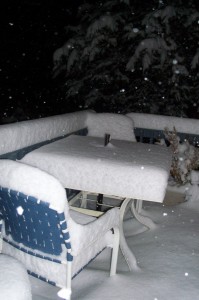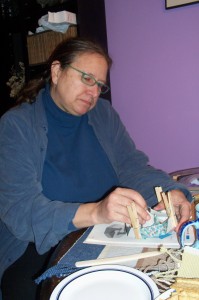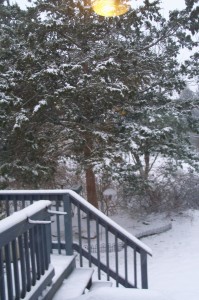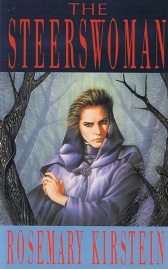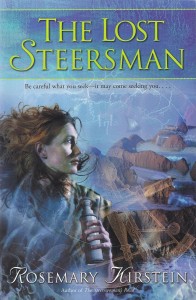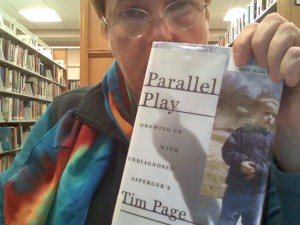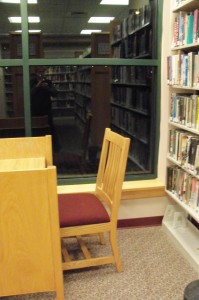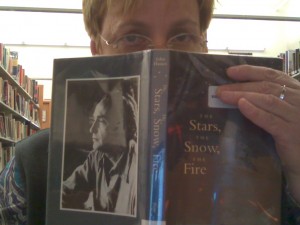As we hunker down
Yes, the storm is upon us, having swept across the country and finally made it to the East Coast.
Genrette Laurie J. Marks is visiting.
We took a lovely little walk down the main street of the quaint CT town I live in.  Well, quaint in the town center. Basically strip-malls elsewhere.
And then it snowed on us!   Coffee at the local cafe, and conversation about writers and writing followed.
Back home, and watching the snow, checking the weather online, etc.
Plus: making a turkey. Just because.  99 cents a pound at the post xmas sales, it would be dumb not to.  Seriously.
real tree, artificial critters
Hope your holidays joyful and jolly, and warm and cozy.
We are glad of our family, and of our pals (real and imaginary).
And of the chance to visit them –Â and their excellent trees.
And my best to all — especially my delightful, brilliant and amazing sister!
when you’re at work and you’ve heard too much Xmas music…
Go to Pandora.com
Create a new station.
For an artist seed, enter “ARROGANT WORMS”.
Listen. Smile.
If the song “Jesus’ Brother Bob” comes on, CRANK IT UP.
A few words about Newtown
I just wanted to say a few words of reassurance to my friends and readers of my blog:
First: I live nowhere near Newtown.   No relatives of mine live there.  No members of my family were directly touched by these terrible events.  And as far as I know, no one connected with me in any way had any connection to the victims, or the victim’s families.  So, those of you around the world who read this blog, and who heard that it happened in Connecticut, and know that I live in Connecticut — be assured that I and my family, and my friends, are untouched, and safe.
That said, of course I’m affected, emotionally.  These events are horrible beyond understanding.
Writers think a lot about how people work; and what goes on in their heads; and how they make decisions; and how personality plays out against the backdrop of the world, and within the context of society. We think about these things so that we can create imaginary versions that seem real, engage our readers, and drive our stories.
In past discussions with other writers, the question of portraying evil comes up on occasion.  And far too often, I hear my fellow writers saying that no one does something knowing that it’s evil — that people who do acts that others call evil actually think that what they’re doing is, in some way, good.
My response to that is always: Usually, yes. Always? No. There really are some people who undertake evil acts in order to undertake evil acts.
And argument on the subject follows, naturally. We’re writers, it’s all very abstract, we’re discussing our craft. And the reason my colleagues most often give comes down to: It’s simply incomprehensible. No sane person could do something intentionally for no other reason that to cause pain, misery, to destroy. No one would do a moral wrong on purpose — they must somehow be misinterpreting it as a moral good.
And my response is still: Usually? Yes. Always? No. The above might explain Adolf Hitler; it can’t explain Newtown, Connecticut.
There are people who undertake evil for the sheer, chemical thrill it gives them; or for the sense of power; or for fame — the whole world is suddenly talking about them. For a person otherwise powerless, these things are very attractive.
And I’m sure that there are other possible triggers to evil acts — ones that I can’t yet identify, because I can’t wrap my brain around them.
And that’s why intentional evil is usually badly portrayed in fiction. Because we can’t really wrap our brains around it. In fiction, the bad writers have cardboard “evil” villains, and the good writers have complex “villains” who are convinced they’re on the side of the angels. Or EVIL gets reified as some supernatural being or a force that possesses an otherwise moral person.
See that? See me get all abstract and analytical, there? See me safely distance myself, so that the truth of this dreadful, horrific massacre can rendered manageable and pushed into the background? That’s me being human.
But I know, I am convinced, that out here in the real world there are people who do evil, knowing they do evil, in order to do evil.
And I hope that the shooter in this case is not one of those people — because I want those people to be few, and far between, and almost never encountered. I want them to be vanishingly rare.
The best source for your steerswomanly needs
It’s that gift-giving season again and, as has become traditional, I’ve waited until almost too late to remind people that I’m a writer, and that you can buy my books as gifts for your friends and family!
Two ways to buy:
METHOD 1 – DIRECT FROM ME: I have copies of the stand-alone mass-market version of The Steerswoman(British edition w/ spooky cover) for $15 which includes Priority shipping (3 business days) anywhere in the US. (Outside the US, cost for shipping would be based on destination.)
Also, I have copies of The Lost Steersmanfor $20 including Priority shipping in the US. (Again, outside the US, cost for shipping would depend on destination. It costs something like $80 to get to New Zealand!)
The Lost Steersman is currently out of print — so if you buy it through Amazon, you’d be buying from a rare-books dealer, and paying extra bucks. The same is true of the stand-alone version of The Steerswoman (“stand-alone” meaning: not as part of the Steerswoman’s Road omnibus that combines it with The Outskirter’s Secret.)
Those are the only two books currently available from me.   To buy from me, email me at rosemary.kirstein@gmail.com, and we’ll sort out addresses and payment method. (Coming soon: Paypal button! But not quite yet, so email until then.)
METHOD 2 – AMAZON.COM: For copies of The Steerswoman’s Road and The Language of Power, your best bet is Amazon.com. (If you gasp as the price of The Steerswoman’s Road, just remember that it’s two books in one: The Steerswoman and The Outskirter’s Secret. Double-sized!)
So, it’s not too late!
On the Job
Not the DayJob, but the real deal, here at the Library — where my favorite carrel has returned to its proper configuration, without my asking.
Back in the bio’s. Your random quote:
“Every so often, someone asks if I would undergo some yet-to-be-discovered treatment that might end my Asperger’s syndrome. Such questions have become politically fraught, and my answer is a complicated one. I wouldn’t wish the condition on anybody — I’ve spent too much of my life isolated, unhappy, and conflicted — yet I am also convinced that many of the things I’ve done were accomplished not despite my Asperger’s syndrome but because of it. I’m sure that it’s responsible, at least in part, for my powers of concentration, which permit me to absorb a congenial subject immediately, write an article in an afternoon or a book in a summer, blotting out everyone and everything until the project is completed. I’m sure it’s one of the reasons I take my work so seriously (I find it far easier to forgive any personal insult than the slightest outside meddling with a project that has seized my attention — do not disturb my circles!).”
— Parallel Play: Growing Up with Undiagnosed Asperger’s, by Tim Page, published by Doubleday, 2009
Another thing that caught my eye in this book is that the author spent some of his childhood in Storrs, Connecticut — just down the road from where I grew up.
In other news: I checked out that book by John Haines (The Stars, The Snow, The Fire), and I’m finding it fascinating. The far north has interested me for a long time, and here’s a real insider’s view, written by someone who knows how to use his words.
Other other news: I picked up the audiobook version of James Branch Cabell’s Jurgen on sale at Audible for $1.99. Score!
Outrage at the Library!
Inexplicably, my favorite carrel has been moved!
It’s in the same place, but it has been rotated ninety degrees left. Why, I do not know… But it’s now absolutely undesirable.
Whereas before I could sit and gaze out the huge window, whilst thinking deep thoughts, now I could only sit and gaze at:
— Two other carrels.
Dang.  There aren’t many places in this lovely library that have both privacy and a window.
I’d rotate the desk back, but it’s a two-person job.
I’d go and ask the librarians for help, but — no, I am alone right now, and do not wish to interact with anyone, thank you very much.
I’d move to the far left seat, which is second best to the far right one, but that’s often inhabited by a young African-American student who clearly also values solitude and a window.   I don’t want to commandeer it, should he show up tonight.  I’ll sit in the middle.
Meanwhile, down to work — but first , your traditional random quote.
“To one who lives in the snow and watches it day by day, it is a book to be read. The pages turn as the wind blows; the characters shift and the images formed by their combination changes in meaning, but the language remains the same.  It is a shadow language, spoken by things that have gone by and will come again. The same text has been written there for thousands of years, though I was not here, and will not be here in winters to come, to read it.”
— The Stars, the Snow, the Fire, by John Haines, published by Gray Wolf Press, 1989
That grabbed me so hard that I’m going to borrow this book.
Some quick internet research tells me that John Haines is quite famous, though he is new to me.  They don’t give two Guggenheim Fellowships to just anyone.  Not to mention all the other awards.
This just reveals how uninformed I am on contemporary poets.
And, alas, Haines passed away last year, I see — here’s the NY Times obit.
Well. Enough maundering, and more pondering….
Back at my post
It was indeed lovely to get away… and so very far away, too!
If my passport had been up to date, I could have hopped over to Mexico, just down the road.
Where I was: Endicott West is an art retreat in Tucson run by the Endicott Studio people, and I was so happy to be able to go there, and spend some time decompressing, and exploring some ideas, and generally thinking deep thoughts.
The thing I noticed about the area around Tucson: it is different. As a person who spends a lot of time imagining really alien landscapes, I rarely have the chance to actually inhabit an alien landscape; but the first thing I realized, as I drove away from the airport was how very, very different the natural world looked.
Nothing that was growing looked like anything growing in New England. There was literally no resemblance. You see something that you think is a tree; you get closer, and realize that it has no leaves, but plenty of thorns. Is it a tree, is it a bush, is it a cactus? When you get some internet access, you look it up and voila! It’s a paloverde, and it’s dropped its leaves because of drought — but hey, that’s okay, because it photosynthesizes through its bark. Which is green.
And all my finely-tuned student-of-nature intuitions are going what the heck? What the heck? This is not normal.
Therefore: I love it.
There are mountains in New England and there are mountains around Tucson, Arizona. And they do not resemble each other, except that they go up. And in New England, if you climb high enough, you get above the tree line, and there are no more trees; whereas in Tucson, if you climb high enough you get up to the treeline, and there are no more cacti. There are trees instead. Up there.
This is backwards. Therefore: I love it.
There were a handful of trees around on ground level: acacias, the paloverdes, mesquite, and here and there a pine of some sort.  Oh, and palm trees, which are NOT native.  Just imported and planted around town for that classy Arabian desert look.
But in New England, the land is, when you get right down to it, mainly inhabited by trees, with room cleared for people, and roads and houses and shopping centers.  The default setting is: trees. And that’s what your subconscious is expecting, and that’s exactly what it does not get in and around Tucson.
And even the bushes have a different configuration, a different profile and texture, and I found my natural expectations constantly confounded and delighted.  When Mike, one of the custodial residents, led me on a tour of the grounds, I could not stop going: “This is different, this is so different…” And he (a Massachusetts native), kept nodding and saying, “I know, I know…”
I can’t adequately express how refreshing that is.  And in a way, comforting… am I the only person who finds the unfamiliar to be comforting?
Well. Must stop blogging. Must write Stuff.
But first, in response to the comments I could not respond to, due to my self-enforced (or attempted) non-verbal blogging:
Lindig: got it right in one!  And yes, it was, I was told, much cooler when I was there.  But you know, I think I might have been better during the hotter season, because I am a natural night owl, and writing out on the porch got really COLD around midnight! Plus: I too liked the lizards.
Sean: the bunny almost took the leaf from my hand.  He was but an inch away, but would come no closer.  So I put it on the ground, and he munched away happily.  This bunny is famous, apparently, or famously friendly.  Plus: saw an actual roadrunner.
Walter: the moon spent a LOT of time in the sky, day and night, due to its phase… but where I normally would have wanted a dark, dark night sky for good stargazing, I found that the waxing moon lit up the desert night, and allowed me to just step off the porch and walk among the cacti whenever I needed to wander and ponder…
Ann: Thoughts were thunk; words were writ.
Sabine:Â Oh, those javelinas!
UPDATE! I was told it’s okay to post the actual Endicott West URL, so I’ve done so here, and above — you should check it out!
